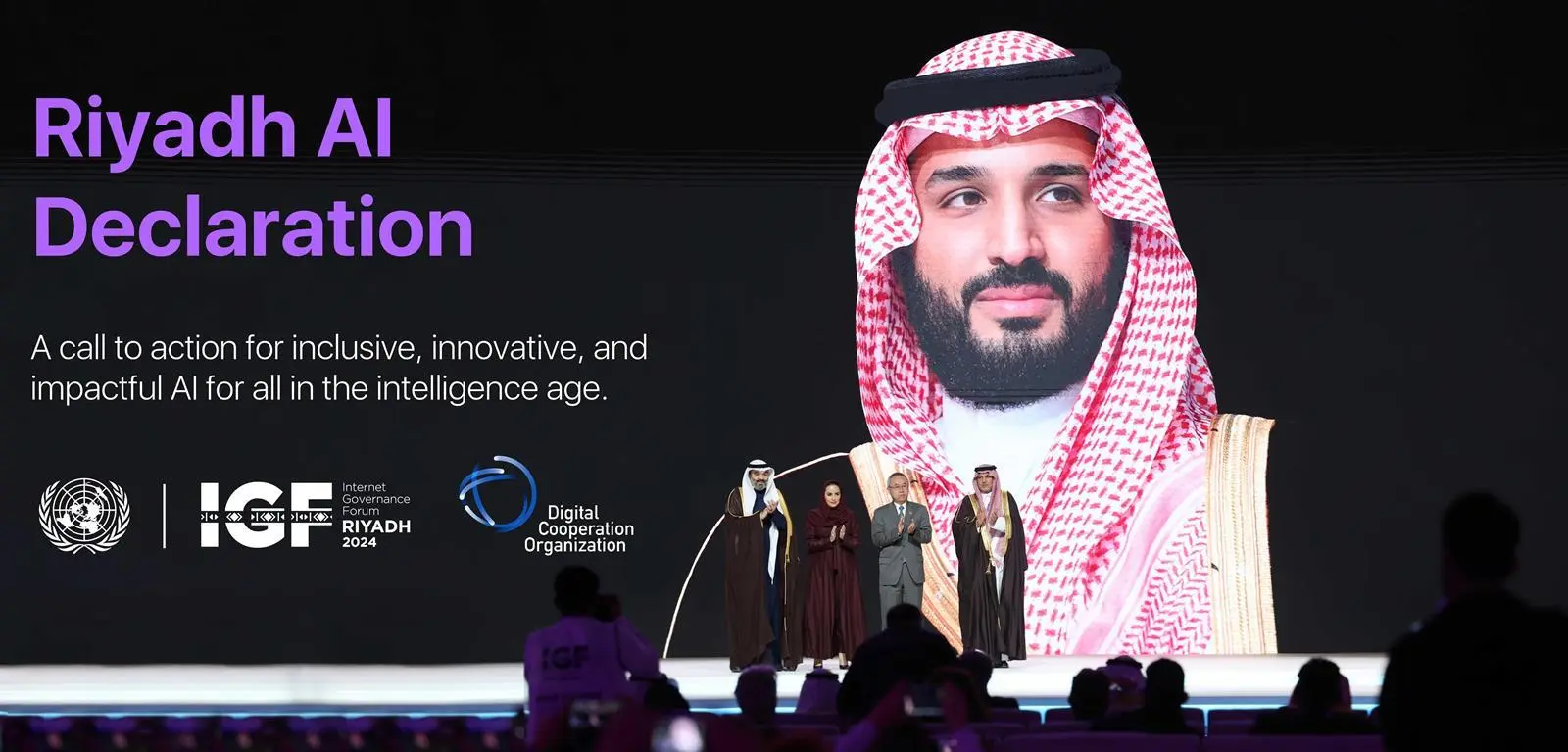At the open of the Internet Governance Forum (IGF) 2024, hosted by the United Nations in Riyadh, Saudi Arabia announced the Riyadh Declaration emphasizing inclusive, innovative, and impactful artificial intelligence.
The Internet Governance Forum (IGF) is an international platform under the United Nations, held annually and hosted by a member state. It unites diverse stakeholders, including government entities, international organizations, the private sector, and civil society, to discuss policies related to internet governance. This is the 19th IGF and runs from December 15-19.
Reporting for Middle East AI News, Carrington Malin notes the Riyadh Declaration’s key details:
- Saudi Arabia’s declaration calls for the leveraging of AI to address global challenges such as economic inequality, environmental protection, and healthcare access.
- The declaration emphasizes increasing digital accessibility and literacy, particularly for marginalized communities.
- The IGF 2024 theme, “Building our Multistakeholder Digital Future,” underlines a commitment to inclusivity and sustainability.
- AI’s transformative potential includes advancing UN Sustainable Development Goals and fostering global economic inclusion.
- Saudi Arabia’s leadership promotes the need for robust AI governance frameworks to manage risks and ensure ethical AI deployment.
“Artificial intelligence is increasingly seen as both an enabler of economic growth and a solution to pressing societal challenges. However, there is also a real danger that AI could rapidly widen, not decrease, the digital divide. Saudi Arabia’s Riyadh Declaration aligns with a broader international focus on ethical AI governance and management of the global impact of AI.”
Minister of Communications and Information Technology Abdullah Alswaha also spoke at the IGF noting that Saudi Arabia is hoping to address challenges such as unequal access to algorithms, data, and computing resources while enhancing fairness and reliability of AI algorithms, minimizing errors that could have negative consequences for individuals or societies.
President of the Saudi Data and Artificial Intelligence Authority Dr. Abdullah bin Sharaf Alghamdi announced that Saudi Arabia has been ranked third globally, following the United States and the United Kingdom, in the Organization for Economic Co-operation and Development’s AI Policy Observatory. Alghamdi also cited UNESCO’s recent report on Saudi Arabia’s readiness in AI, which commended the Kingdom’s achievements in this advanced technical field. The report, part of UNESCO’s initiative to assist member states in assessing their readiness for adopting AI in alignment with ethical values and international standards
Riyadh Declaration Principles:
Artificial Intelligence for an Inclusive, Sustainable, and Governed Digital Future
} Advance AI technologies and related governance frameworks that are inclusive, fair, and built on principles of integrity and respect
} Reaffirm to our vision of a digital future where AI contributes meaningfully to the wellbeing of all individuals, supports the Sustainable Development Goals and drives innovation that benefits society
} promote digital literacy and skills development initiatives that empower individuals to navigate the digital landscape confidently, ensuring that all members of society can participate in and benefit from AI advancements
} promote robust oversight mechanisms that promote accountability, fairness, and transparency in AI deployment
} Strengthen international cooperation in AI research and development, sharing best practices and resources to ensure that the benefits of AI are distributed equitably across nations
} Emphasize that every individual, regardless of geographic location, economic status, or technological proficiency, has access to a secure and verifiable digital ID by 2030
} promote the development and harmonization of regulations that support the mutual recognition of digital IDs, easing regulatory compliance and fostering an environment of trust in digital transactions
} Recognize the significance of developing a robust framework (including Digital ID Adoption Index ) to evaluate digital ID adoption, emphasizing active usage as a key metric to inform targeted strategies for inclusivity, engagement, and system improvement
} Emphasize the importance of cross-border interoperability as a catalyst for facilitating global trade, travel, and cooperation and advocate for the development of international standards that promote interoperability while respecting data protection, privacy, and local sovereignty
} Recognize that a robust digital identity system is a key enabler for unlocking global economic value and foster the adoption of secure digital identities to drive significant economic growth, particularly in sectors such as e-commerce, finance, and healthcare.
Online Safety
} Promote in international cooperation to ensure that data collection and storage practices are safe and secure
} Share experiences and good practices for data policy to ensure data protection and privacy
} Explore and better understand privacy enhancing technologies
} Advance policies to combat misinformation and disinformation
} Recognize the importance of child protection and foster the development of guidelines and best practices against cyberbullying
} Support the development of age-verification technologies to ensure online children protection
To read more, click here, here, here, here and here.









